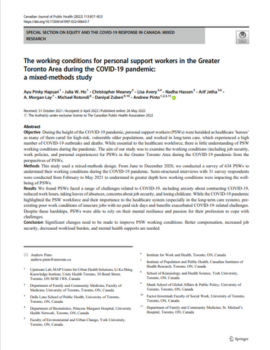Sign Up
Contact Us
We will get back to you as soon as possible.
Please try again later.
The working conditions for personal support workers in the Greater Toronto Area during the COVID-19 pandemic: a mixed-methods study
As we recover from the COVID-19 pandemic and reflect on strategies to improve our public health response to future threats, it is imperative that we consider decent work for personal support workers who provide care for our most vulnerable. These findings highlight potential areas for labour policy reforms related to the PSW workforce.
Author: Ayu Pinky Hapsari, Julia W. Ho, Christopher Meaney, Lisa Avery, Nadha Hassen, Arif Jetha, A. Morgan Lay, Michael Rotondi, Daniyal Zuberi & Andrew Pinto
Publication Date: May 26, 2022
Description:
Objective: During the height of the COVID-19 pandemic, personal support workers (PSWs) were heralded as healthcare ‘heroes’ as many of them cared for high-risk, vulnerable older populations, and worked in long-term care, which experienced a high number of COVID-19 outbreaks and deaths. While essential to the healthcare workforce, there is little understanding of PSW working conditions during the pandemic. The aim of our study was to examine the working conditions (including job security, work policies, and personal experiences) for PSWs in the Greater Toronto Area during the COVID-19 pandemic from the perspectives of PSWs.
Methods: This study used a mixed-methods design. From June to December 2020, we conducted a survey of 634 PSWs to understand their working conditions during the COVID-19 pandemic. Semi-structured interviews with 31 survey respondents were conducted from February to May 2021 to understand in greater depth how working conditions were impacting the well-being of PSWs.
Results: We found PSWs faced a range of challenges related to COVID-19, including anxiety about contracting COVID-19, reduced work hours, taking leaves of absences, concerns about job security, and losing childcare. While the COVID-19 pandemic highlighted the PSW workforce and their importance to the healthcare system (especially in the long-term care system), pre-existing poor work conditions of insecure jobs with no paid sick days and benefits exacerbated COVID-19–related challenges. Despite these hardships, PSWs were able to rely on their mental resilience and passion for their profession to cope with challenges.
Conclusion: Significant changes need to be made to improve PSW working conditions. Better compensation, increased job security, decreased workload burden, and mental health supports are needed.
Access: Free
Keywords: Personal support worker, Healthcare aide, Employment, Work conditions, Long-term care, Home care
Other Research and Reports You May Be Interested In:
Stay Informed
Want updates, news, and announcements about research, innovation, and leading practices in home and community care?
Get Connected. Sign Up Now.
All Rights Reserved | A Division of OCSA



